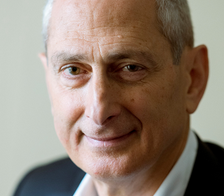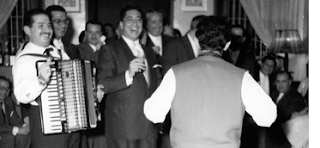
With the Iraqi-Jewish archive poised to return to Iraq in September 2018, businessman and philanthropist David A Dangoor makes a plea in JNS News for the archive to be a bridge-builder for normalising relations between Arabs and Jews and restoring the rights of Iraqi Jews. It does not matter to him where the archive ends up as long as Jews have access to it (with thanks: Imre, Independent Observer).
David A Dangoor commissioned the film Remember Baghdad
The answer to what happens next should lie in not whose property it is, but where would it be best preserved and provide access for all, especially in its potential use as a gateway towards better relations between Jews and Arabs.
Between 1950 and 1952, approximately 130,000 Iraqi Jews were airlifted to Israel, where they became fully integrated into the country despite their arrival with no assets. This constituted around 75 percent of the total Iraqi Jewish community at the time. While the creation of the State of Israel was the proximate driver, the Jewish community, which had been living in many places around Iraq, had already been traumatized by the Nazi-directed troubles in the early 1940s that highlighted the need for a safe haven, which Israel now represented.
The way we were: a scene from Jewish life in Iraq as captured in Remember Baghdad
Those of us who remained behind subsequently fled in the ensuing years—after the Iraqi government stripped us of our citizenship, property and business interests—to places like the United Kingdom.
Many of us, despite how it ended, look back fondly on our lives in Iraq and are deeply proud of our more than three-millennia sojourn there. Some of the greatest rabbis, scholars and artists enriched not only world Jewry with their work, but the non-Jewish world around them.
Arabic was our mother tongue, our culture and a strong part of our identity. Iraq is still in our blood and in our bones. It’s like a distant bell ringing in the back of our heads, always reminding us where we came from.
For those, like for me, Baghdad is the formation of our identity.
To be a Jew is sometimes to be a bridge to the past, but I believe that we can also serve as bridges to the future.
In the Iraq where I was raised, Jew, Christian, Muslim, Sunni or Shia worked, learned, sang and danced together. We lived side by side in peace and harmony.
I believe that while the Jewish community there is no more, perhaps the Iraqi Jewish Archive can serve as a new conduit between peoples, nations and religions.
With ISIS finally expelled from Iraq, this could be an auspicious time for Jews of Iraqi origins to rebuild ties with our former country, and for the leaders of the Republic of Iraq to provide gestures of reconciliation to its Diaspora Jewish community.
We hope it could begin with ensuring the Jewish character of holy sites such as the Prophet Ezekiel and Ezra the Scribe, and that the cemeteries of our families and ancestors are well-maintained. Most of all, we hope to be provided with visas to visit Iraq, or better still, to have our passports and citizenship returned and restored.
I know I speak for many when I say I would love to travel to Iraq to see my family home on the banks of the Tigris and visit the places in my dreams of childhood.
For that to happen, there would need to be a complete change in the way the people and government of Iraq viewed people of different faiths. There would need to be a genuine desire to welcome them, treat them with care and consideration, and respect their national aspirations—something now common in many parts of the world.
If this were to be achieved, it would matter less where the archive resided because we would have access to it. Perhaps an agreement could be formulated whereby the archive would also be on display at various locations, allowing this collection of artifacts to educate and inform others.
For Jews and non-Jews around the world, this could serve as a testament to the good relations that Jews and Arabs shared in the past, and serve as a point of entry in exploring how these ties could become strong and vibrant once again.
To Iraqis, the archive communicates the long-standing Jewish community that lived among them. They could demystify the tradition and culture of the Jewish people in the hopes of exploding certain myths and as a point of greater engagement.
I call on all those who are involved in the issue not to use the Iraqi Jewish Archive as a point of division, but instead, as a point of unity and harmony. Not to hide the materials away in the dark, but to allow the artifacts to shine a light in informing the world about how Jews and Arabs are not so very different. About how we can and should live side by side.
Let these artifacts inspire and not discourage relationships, so that we can regain aspirations of a better future for all the peoples of the region.


Leave a Reply